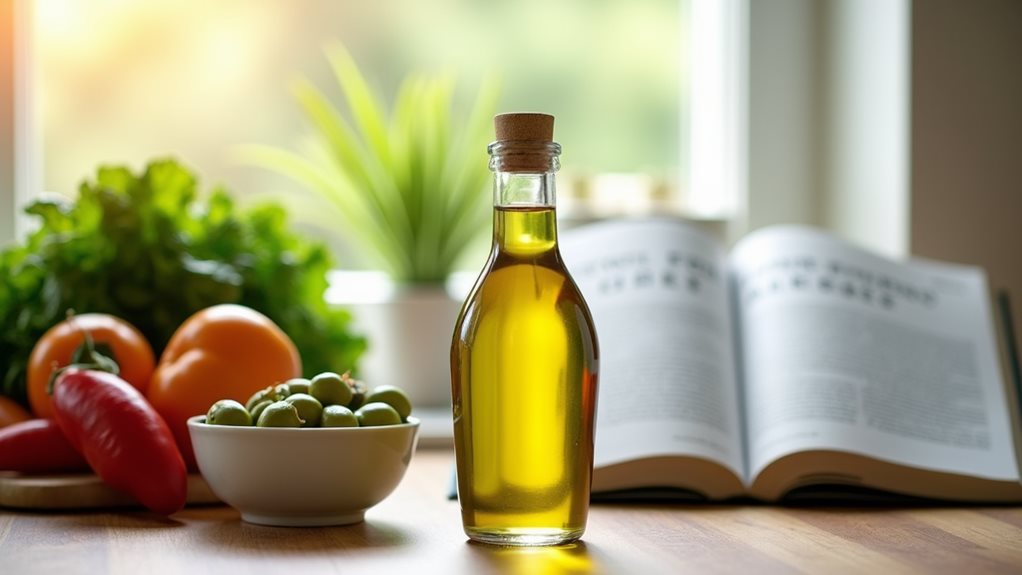
Extra Virgin Olive Oil is revered for its myriad health benefits, including bolstering immune function, reducing cancer risks, and supporting heart health through its rich content of antioxidants and healthy fats. Its significant anti-inflammatory properties and role in stroke prevention highlight the power of incorporating this nutritious oil into a daily diet. Exploring further may uncover additional ways in which olive oil can enhance well-being and manage chronic conditions effectively.
Key Takeaways
- Extra Virgin Olive Oil boosts immune function by enhancing the body's infection-fighting abilities.
- Contains polyphenols that help in preventing cancer by mitigating oxidative damage.
- Supports heart health by managing cholesterol levels and improving cardiovascular function.
- Reduces stroke risk through its anti-inflammatory and antioxidant properties.
- Acts as a potent anti-inflammatory, mimicking effects similar to common anti-inflammatory drugs.
Boosting Immune Function With Extra Virgin Olive Oil
Extra Virgin Olive Oil, rich in Vitamin E, plays an essential role in boosting immune function.
Its immune boosting properties are linked to its high antioxidant content, which reduces oxidative stress and inflammation, significant factors in immune health. Regular consumption of olive oil can improve the body's ability to fight off infections and diseases.
Additionally, olive oil benefits include modulation of immune responses, potentially aiding in conditions like inflammatory bowel disease and rheumatoid arthritis.
The Role of Olive Oil in Cancer Prevention
Olive oil, particularly in its extra virgin form, is increasingly recognized for its potential role in cancer prevention. Rich in polyphenols, these antioxidants are essential in mitigating oxidative damage, a known contributor to cancer development.
Recent cancer research highlights how these compounds may help reduce the incidence of certain cancers. Adhering to dietary guidelines that recommend the inclusion of healthy fats, such as extra virgin olive oil, can contribute to a balanced diet that supports overall cellular health.
This integration not only aligns with preventive health measures but also enhances the nutritional quality of daily consumption patterns, fostering long-term health benefits.
How Olive Oil Supports Heart Health

A cornerstone of the Mediterranean diet, extra virgin olive oil is celebrated for its significant contributions to heart health.
Its high content of monounsaturated fats aids in cholesterol management by lowering harmful LDL cholesterol levels while maintaining beneficial HDL cholesterol. This balance is essential in preventing the build-up of cholesterol in the arteries, thereby reducing the risk of heart disease.
Additionally, the oil's rich polyphenol content offers antioxidant properties that support cardiovascular health.
Regular consumption of extra virgin olive oil can lead to improved heart function and a decreased risk of developing chronic heart conditions, making it a heart-healthy dietary choice.
Stroke Prevention Through Olive Oil Consumption
Consumption of extra virgin olive oil has been linked to a significant reduction in stroke risk, a major concern in public health due to its status as the second leading cause of death worldwide.
- Substitution for Saturated Fats: Replacing saturated dietary fats with olive oil can lower stroke risk by improving lipid profiles.
- Antioxidant Properties: The antioxidants in olive oil help prevent the oxidative stress implicated in stroke development.
- Improved Blood Flow: Olive oil aids in maintaining healthy blood vessels, essential for preventing clots that can lead to strokes.
- Anti-thrombotic Effect: It reduces platelet aggregation, thereby minimizing the risk of thrombosis and stroke.
The Anti-Inflammatory Benefits of Olive Oil

As research continues to reveal the health benefits of dietary choices, extra virgin olive oil emerges as a potent anti-inflammatory agent. Its components are essential for managing chronic inflammation and aiding in pain management. Studies indicate that the phenolic compound oleocanthal mimics the effects of anti-inflammatory drugs.
| Component | Function | Benefit |
|---|---|---|
| Oleocanthal | Mimics Ibuprofen | Reduces inflammation |
| Polyphenols | Antioxidant | Lowers chronic inflammation |
| Vitamin E | Immune support | Enhances pain management |
This profile supports olive oil's role in a health-focused diet, providing relief and management for conditions driven by inflammation.
Olive Oil as a Source of Antioxidants and Healthy Fats
Extra Virgin Olive Oil is revered not only for its flavor but also as a rich source of antioxidants and healthy fats, playing an essential role in preventive health care and disease management.
Here are key points:
- Antioxidant Benefits: Contains phenolic compounds that reduce oxidative stress and cellular damage.
- Monounsaturated Fats: Mainly composed of heart-healthy monounsaturated fats that support cardiovascular health.
- Anti-inflammatory Properties: The polyphenols in olive oil help reduce inflammation markers in the body.
- Chronic Disease Prevention: Regular consumption is linked to lower risks of various chronic diseases due to its healthy fat profile and antioxidant capacity.
Managing Diabetes With the Help of Olive Oil

Incorporating Extra Virgin Olive Oil into daily dietary habits has been linked to a significant reduction in the risk of developing type 2 diabetes.
Olive oil benefits diabetes management by enhancing insulin sensitivity and stabilizing blood glucose levels. This effect can be attributed to its rich content of monounsaturated fats and phenolic compounds, which improve metabolic health.
Regular consumption as part of a balanced diet can lead to a healthier glycemic profile. Studies consistently show that those who include olive oil in their diets have lower diabetes incidence rates, underscoring its role as a valuable tool in managing this condition.
Frequently Asked Questions
How Does Olive Oil Influence Weight Management?
Olive oil may influence weight management by boosting metabolism and controlling appetite. Its healthy fats can promote satiety, potentially reducing calorie intake and aiding in sustainable weight control. This aligns with a health-focused, evidence-based perspective.
Can Olive Oil Improve Skin and Hair Health?
A study found that olive oil, rich in vitamins and antioxidants, can greatly enhance skin and hair health. Its use in skincare and haircare routines moisturizes deeply and improves texture and resilience.
Is Olive Oil Safe for Cooking at High Temperatures?
Olive oil has a moderate smoke point, making it suitable for medium-heat cooking. Its distinct flavor profile enhances food, but high temperatures may degrade beneficial nutrients and alter taste.
How Long Does Extra Virgin Olive Oil Maintain Its Quality?
Extra virgin olive oil, like a shield against time, maintains its quality for about 18-24 months. Oxidative stability and proper storage extend its shelf life, preserving its health benefits and robust flavors.
What Are the Differences Between Virgin and Extra Virgin Olive Oil?
The differences between virgin and extra virgin olive oil primarily lie in acidity levels and extraction methods. Extra virgin has lower acidity, offering enhanced health benefits due to higher concentrations of beneficial polyphenols.
Conclusion
To sum up, Extra Virgin Olive Oil stands as a pivotal component in a health-conscious diet, backed by substantial evidence of its multifaceted benefits. From enhancing immune function to preventing chronic diseases such as heart disease and diabetes, EVOO's rich content of antioxidants and anti-inflammatory properties underscores its significant role in promoting longevity and overall well-being. Incorporating EVOO into daily meals could be a strategic move towards achieving a healthier life, aligning with preventive health care paradigms.





